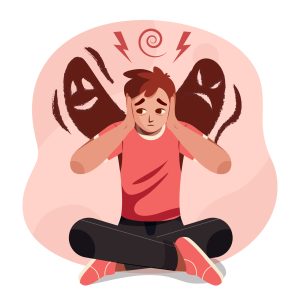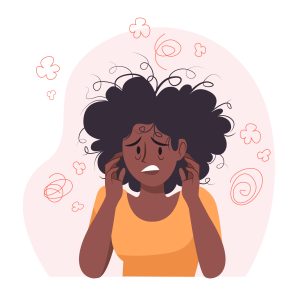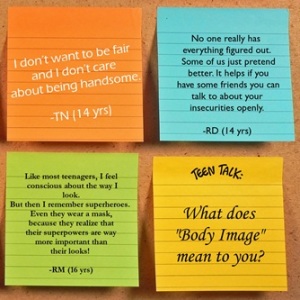
Understanding Common Causes Of Anxiety In Teenagers
Anxiety In Teenagers And Its Significance Adolescence is a crucial period marked by significant physical, emotional, and cognitive changes in an individual. Teenagers see these

Anxiety In Teenagers And Its Significance Adolescence is a crucial period marked by significant physical, emotional, and cognitive changes in an individual. Teenagers see these

Adolescence is a time of many shifts, both in the mind and the body. It is a transformative period, where there is a growing curiosity

“I was seeing someone I met online. We went on a few dates and things seemed to be going well. All of a sudden no

The way you were brought up, the experiences you had with your parents and even your peer groups play a very important role in shaping

At times, you just know that this is where you belong, with your own close knit circle of like-minded friends.
However, have you ever found yourself in a group of friends wondering you don’t really belong in here? It might have felt like you have to try so hard fitting in with them.

Body Image is what you think and feel about your physical self or your body. As you enter adolescence, “body image” takes center stage and you will have days when you start to feel awkward and uncomfortable in your body. This article introduces you to a healthier and more positive way of looking at yourself and your body.

R.M. is a cheerful 14 year old teenager who stays with her parents in Mumbai. She likes science and finds history very boring. She loves watching movies and spending time with her friends. She sounds just like you or someone you might know, doesn’t she? Just like you, she has a profile on Facebook, Twitter, Instagram…you name it! And just like you, she can’t wait to get home from class and come online to update her status; chat with her friends or post a comment about something funny that happened at school.
Since the past week however, she has been behaving differently.
Last week, when she got home from school and signed into Facebook, a classmate had commented something in jest on her picture. It was funny at first, but then the comments got mean, and extremely hurtful. The same person from her class, then started posting mean status updates and sending her unkind messages.
She didn’t know what to do or how to make it stop. So, she hasn’t gone to school for most days of the week saying she’s feeling unwell. She’s been withdrawn and her parents can’t understand what happened. She has been avoiding messages from her friends. She feels hurt, scared and even a little angry. Wouldn’t you feel the same way?

You are able to live with yourself because you know you are fundamentally good!
You know that all your inadequacies and the not so good qualities exist either because they are judged that way by people around you or because you picked them up somewhere on the way because of the difficulties that life sent your way.
You are correct! The deepest core of you, of all of us, every person is beautiful.

A classmate of mine in school and college successfully hung herself from a fan… It was devastating… Years later here I am-a psychologist- with several hundred sessions of having heard the teenagers side of the story-the hopelessness, helplessness and the frustrations. When Rediff asked me to write about teenage suicide, everything came together 🙂

If you find yourself getting angry and irritated easily and are ready to ‘give it back’ most of the time, you are also probably quite bottled up inside. Few people seem to understand you and most brand you as an ‘angry teen’. You may have tried ‘controlling your anger’ and ‘being less angry’ but may not have succeeded to your satisfaction (and those of others). Often, what we do to manage aggression is try “not to get angry” even when we are actually angered. Think about it. It’s like mom is repeatedly saying something to you, you’re fuming within but try to “be calm” and mask your anger. No wonder then that you end up snapping or yelling at her despite not wanting to. What we actually doing here is ‘controlling’ or attempting to suppress our anger. It’s like trying to shut an overstuffed suitcase. Suppression is never healthy, it only breeds sadness, frustration and makes us feel that the people around us are unfair.

We specialize in combining psychotherapy with deep wellness practices like mindfulness and meditation and creating a customized mental health plan for individuals and organisations.
We specialize in combining psychotherapy with deep wellness practices like mindfulness and meditation and creating a customized mental health plan for individuals and organisations.

A young woman from another country moved with her family to live for one year in a town near the monastery. When, in the course of the year she discovered the monastery, she would periodically visit to have discussions with the Abbess. The Abbess introduced her to meditation, which became very meaningful for the young woman.
When the family’s year-long stay was drawing to an end, the young woman asked the Abbess, “In my country there is no Buddhism and no one has even heard about meditation. How can I continue to learn and deepen the practice you have started me on?”
The Abbess said, “When you return home ask far and wide for who, among the wise people, is recognized as having the greatest ability to listen. Ask that person to instruct you in the art of listening. What you learn about listening from such a person will teach you how to further your meditation practice.
― Gil Fronsdal, A Monastery Within: Tales from the Buddhist Path